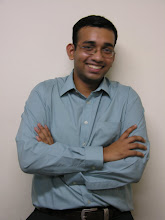Nandan Nilekani existed for so long only in the Economic Times for me. For all my non-Indian readers, Economic Times represents the Indian attempt at producing a fashionably serious financial newspaper that borrows its paper colour from London’s Financial Times. Nandan Nilekani is the co-founder of Infosys, the behemoth Indian software company whose success story is used much beyond prescription, to put forward the case of India Shining. Mr Nilekani came to the London School of Economics to launch his new book on ‘Imagining India’. And by virtue of the fact that for some reason, many great people discover a past-time in impressing LSE students and professors, Nandan Nilekani floated right out of the Economic Times to brush past me to the back stage as I waited outside for the doors of the lecture theatre to open.
'Nandan', as most of the people on stage chose to repeatedly addressed him as; was the second CEO I had seen in my life so far. The first was Vikram Pandit, head of CitiGroup, who happened to be exceedingly lucid in all topics, except on those related to finance and banking. And so he took from me the pride of being a student of Finance, given that I had quite failed to read his lips. And filled me with apprehension that Nandan’s domain being software, could prove to be completely out of my league.
Nandan Nilekani comes to the podium to talk about his perspective on India. And what I immediately get from him is a content page of...... ideas-
Ideas that in Nandan’s view have already struck India,
Ideas that are in the pipeline, and
Ideas that will eventually strike. Three+Two+Two. "Seven ideas", Mr Nilekani solemnly announced as if they may be some holy commandments about to be dictated from the scriptures.
But he is the founder of Infosys after all; and these are after all His ideas.
So I listen.
1. Population is now considered as a human resource than a social liability.......
2. Indian corporate houses started from being sceptical, and are now receptive to globalisation........
3. Primary education needs to be boosted.........
4. Infrastructure needs to be prioritised................
.........how higher education needs bureaucratic freedom, how politics needs to change, how climate change was important and to summarise, how India is a great country with great potential.
I was accompanied by two friends of mine, geeks whose currency of conversation usually entailed words like markets, funds, private equity holdings, returns, companies etc. Infact one of them had come geared to ask many uncomfortable questions on Infosys and other matters of corporate importance. But with Mr Nilekani suddenly getting all worked up about demographic patterns and climate change figures, I could not but miss a kind of bemused silence from my neighbour.
Because who we got to see today was Nandan Nilekani, the ace politician- campaigning for his book. Politician-type discussion into our problems, our strengths, our weaknesses. As if all the while we were waiting for the cofounder of a NASDAQ listed company to spell it out to us. Telling us that primary education is important and so is infrastructure. Which is absolutely fine, except that it was coming from a person whom one associates with the Innovative Indian Brain. It’s the kind of person we would look to for answers. The kind of person who gives keys to questions. Instead we got a Nandan Nilekani who provided flourishing question marks at the end of questions, and questions that we already knew.
Can the cofounder of Infosys attempt to tackle any of these problems using his experience as a CEO? That answer we are interested in, and that answer we do not get. What we get instead is what happens on bringing five argumentative Indians on a group-discussion table. Exactly the kind of good-to-hear rambling with no conclusion that you get to hear in overdose during election time in India.
But Nandan started his speech by some joke on Indian politicians during election time, and we all laughed. So even at the end, we still failed to think any less of our hero. In India, once a hero, forever a hero; and once a villain there is no way out of the public’s sentimental disdain. It was announced that Mr Nilekani would be around to autograph books in case you wanted to buy it from the stand outside. Immediately a serpentine queue to the stage materialised, every Indian student clutching a copy of the twenty pound book.
Perhaps when they will get home, look beyond the autograph and unfurl the pages, they will realise that there was nothing in their twenty pound purchase that they did not already know. Twenty pounds was just the price of some excellent packaging and memoir jotting.
And ofcourse, of the autograph.
Saturday, 25 April 2009
Subscribe to:
Comments (Atom)
